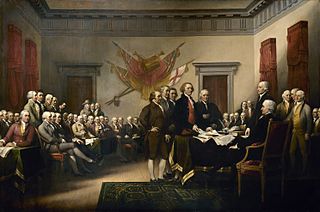Snuffing Out The Light Of Capital Punishment

The problem for the state of Ohio and for the rest of the country, however, is that the highest legal power we rightly possess does not involve injection.
The death penalty is wrong, but not for the reasons you think. The death penalty isn’t wrong because of your religious doctrine, or because it took Mcguire a full 10 minutes of convulsing and gagging to die. It's not because the Europeans who make the drugs traditionally used in the process find it so distasteful they they refuse to sell them to us. It's not even because 90 percent of the other countries in support of capital punishment are what we call third world.
The death penalty, capital punishment, is wrong because of a document we have built our society upon. It is wrong because the Declaration of Independence tells us it is.
In 1776 our founding fathers wrote, “We hold these truths to be self-evident, that all men are created equal, that they are endowed by their Creator with certain unalienable Rights, that among these are Life, Liberty and the pursuit of Happiness.”
We look to the second half of this passage for the key ideals and rules by which we, as Americans, are to live our lives.
First, there is the idea that all men and women are given certain rights by a (capital C) Creator. The important note here is that our unalienable rights have nothing to do with the United States, or any other entity. The United States gives us the (alienable) right to own guns, to put our dogs in sweaters and to eat hamburgers the size of our heads. This means the United States can take those rights away at any given time. We are not created with the right to put a small animal in expensive cashmere; it is granted to us.
But the United States does not grant us the rights to "Life, Liberty and the pursuit of happiness," and it does not have the power to take any of those rights away.
This isn’t some cockamamie theory based on political preferences or a weak stomach. It’s a theory rooted in the beliefs and words of our founding fathers, the same founding fathers who gave us the constitution we base our system of law upon. Those men were of a belief that the right to life our Creator gives us is unalienable. Be it from a Christian, Muslim, Jewish or Spaghetti Monster god, those three things are unalienable.
According to Webster’s Dictionary, unalienable means something is “unable to be taken away from or given away by the possessor.” Your life, liberty and ability to pursue happiness are not to be taken away from you by man (whether this applies to only Americans under this document is a debate for another time.) Not only are they not to be taken away, they are unable to be stripped of you. To do so would be to place us in the place of the Creator (whomever you decide that to be), and to overstep our boundaries as flawed humans.
Granted, this could be a debate on the prison system as a whole, but for now we're only talking about our government taking a life. While it can be argued that sending someone to prison takes away both their liberty and ability to pursue happiness, that's a question for another day.
We can see how ignoring this paradigm has manifested itself in negative ways. More than once, we have wrongly executed someone for a crime they did not commit. Those wrongful executions carry a far greater importance than the times we get things "right" when we subject someone to the death penalty. Those executions of innocent men and women show exactly why our founding fathers thought our Creator is the only one capable of giving and taking life. Our fallibility leads us to make mistakes in life-or-death situations. It leads us to push the plunger for an innocent man who, even if he had been guilty, should not have seen us towering above him playing executioner.
My opinion of capital punishment is irrelevant in this case, as is yours. Capital punishment is not an issue we can debate both sides of if we take the time to actually look at the ideals and laws this nation was founded upon. We cling so tightly to the rest of our Declaration of Independence and hold the constitution up as anointed, yet choose to ignore the true meaning of what life is, how it is to be respected and who may grant it or take it away.
Capital punishment is not a debate because in reality it isn’t an issue that lends itself to gray area. It’s not an issue that allows us to alienate unalienable rights if we find ourselves particularly revolted by a crime. It’s not an issue that allows us to ignore our founding principles because we think Dennis Mcguire crossed some invisible threshold and now deserves to die. It is an issue with an answer found in the Declaration of Independence.
This answer shows us just how far we have overstepped our rights as men and women in our snuffing out the lives of others. It is time we remembered the ideal of life found in those documents.
It is time we declare independence from the idea that we have some God-given right to take away the life the Creator gives because our fallible court system made of fallible people says it to be so.
It is time we put the issue of capital punishment in the ground. But unlike Mcguire, we wont make it suffer in agony before we snuff out the light of this chapter of history for good.



